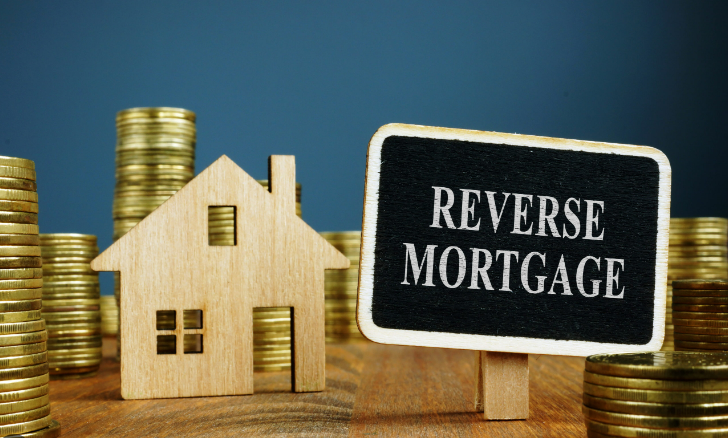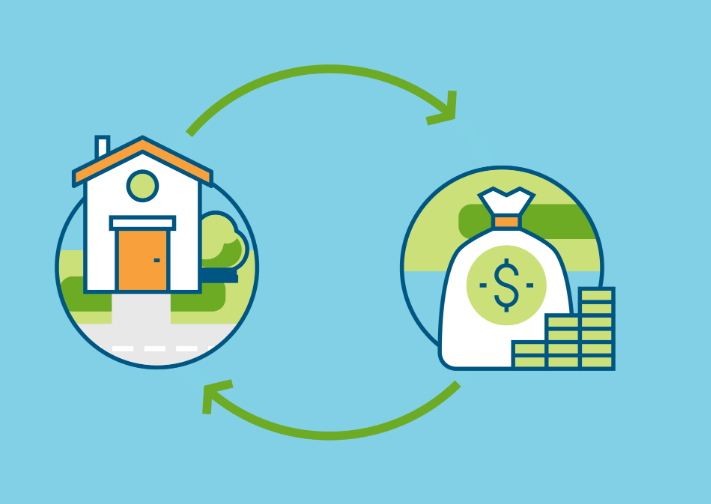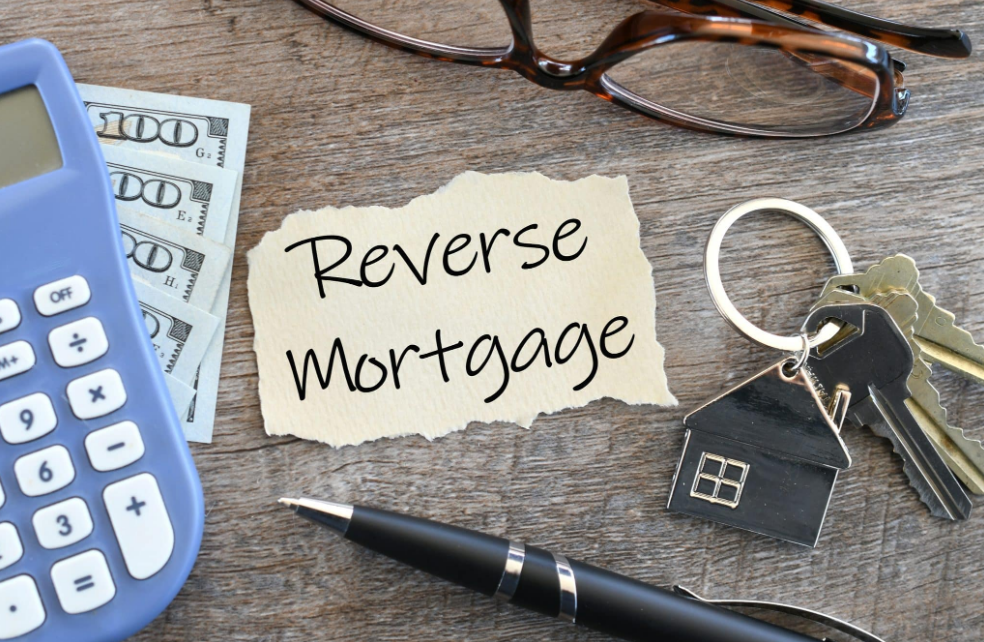
If you’re over 62, a homeowner, and seeking additional retirement income options, a reverse mortgage could be worth considering. This financial tool allows you to convert your home equity into cash without the obligation of monthly repayments or fixed payments, offering flexibility in managing expenses such as mortgage debt or healthcare costs. However, like any financial product, there are both advantages and disadvantages to consider before pursuing a reverse mortgage.
How Do Reverse Mortgages Work?
Chances are, you’re familiar with a conventional mortgage, where you make monthly payments to your lender. However, a reverse mortgage flips the script: instead of you paying the lender, they pay you. Over time, the lender gradually purchases the equity in your home, while you retain ownership. The loan is repaid in full upon your passing or when you sell the home.
- Reverse Mortgage: Equity decreases, debt increases.
- Forward Mortgage: Equity increases, debt decreases.
Types of Reverse Mortgages

There are basically three types of reverse mortgages.
Single-Purpose Reverse Mortgages
This particular type of mortgage is commonly facilitated by local, state, or nonprofit organizations, setting it apart as one of the most financially advantageous options among the three. Unlike other forms of reverse mortgages, providers of this mortgage specify the purpose for which the funds can be used, often earmarking them for a particular expense or financial need. Moreover, homeowners must meet specific eligibility criteria to qualify for this type of mortgage, ensuring that the funds are allocated responsibly and in alignment with the intended purpose. One notable advantage of this mortgage variant is its lower initial cost, making it a preferred choice for homeowners seeking to leverage their home equity while minimizing upfront expenses.
Home Equity Conversion Mortgages (HECMs)
Home Equity Conversion Mortgages (HECMs) represent federally-insured mortgages backed by the U.S. Department of Housing and Urban Development (HUD). While they offer valuable financial flexibility, it’s important to note that HECMs typically entail higher costs compared to traditional home loans, with elevated upfront expenses. Despite these costs, HECMs are immensely popular due to their accessibility, as they do not impose stringent medical requirements or income restrictions. This versatility allows homeowners to utilize HECMs for a wide range of purposes, making them a preferred choice for many seeking to tap into their home equity.
Proprietary Reverse Mortgages
A proprietary reverse mortgage is tailored for homes with significantly higher appraised values, making it suitable for individuals seeking larger cash advances. Homeowners with lower mortgage balances may qualify for even more substantial funds under this type of mortgage.
Reverse Mortgage Pros

A reverse mortgage can indeed present a complex financial arrangement, but it comes with potential advantages under certain circumstances:
- No Repayment Obligation: As long as you reside in your home as your primary residence, you typically aren’t required to repay the cash received.
- Flexible Cash Options: You have the flexibility to choose how you receive the cash, whether as a lump sum, a line of credit, regular monthly payments, or a combination of these.
- Non-Taxable Proceeds: The funds obtained through the reverse mortgage are generally not considered taxable income.
- No Minimum Income Requirement: Unlike traditional loans, there’s no mandated minimum income needed to qualify since there’s no monthly repayment obligation.
- Benefits Preservation: Cash advances typically don’t affect your eligibility for Medicare or Social Security benefits.
- Protection from Negative Equity: The Federal Trade Commission ensures that you won’t owe more than the overall value of your home, even if you receive payments exceeding its worth due to outliving the loan.
- Homeownership Retained: You retain the title to your home and continue to be its legal owner throughout the duration of the loan.
- Equity Disbursement: Upon the sale of your home and full payment of lending fees, any remaining equity is returned to you or passed down to your heirs.
- Assisted Living Transition: With a Home Equity Conversion Mortgage (HECM), you have the option to reside in an assisted living facility for up to a year before the loan becomes due, providing ample time to sell the property.
Reverse Mortgage Cons
- To qualify for a reverse mortgage, you must be at least 62 years old and undergo mandatory counseling regarding mortgages.
- Over time, the debt on a reverse mortgage increases as interest accrues on the loan balance.
- Closing costs and loan origination fees can be expensive, although they may be rolled into the total loan cost.
- Reverse mortgages consume your home’s equity, potentially leaving you and your heirs with fewer assets.
- During the mortgage’s life, you may incur monthly service fees.
- There are restrictions on the initial borrowing amount and the total mortgage size in the first year.
- Most reverse mortgages have variable interest rates tied to short-term indexes.
- Failure to pay homeowner’s insurance or property taxes promptly can trigger the loan to become due.
- Interest deductions are not permitted until the loan is fully repaid.
- Before deciding on a reverse mortgage, carefully review all details and consider consulting a financial expert to protect your family and assets. Avoid relying solely on advice from bank salespersons.
Before deciding on a reverse mortgage, carefully review all details and consider consulting a financial expert to protect your family and assets. Avoid relying solely on advice from bank salespersons.
Is a Reverse Mortgage Right For You?

A study published in the Journal of Urban Economics highlights that reverse mortgages tend to default at a significantly higher rate compared to conventional mortgages. This trend often stems from homeowners failing to keep up with property tax or house insurance payments. The elevated default rate has raised concerns that reverse mortgages may be marketed to financially vulnerable individuals. Therefore, it’s wise to exercise caution before hastily accepting an offer from your bank.
However, when utilized wisely, a reverse mortgage can be advantageous.
For instance, if you intend to remain in your current home until the end of your life, a reverse mortgage offers a means to leverage your home’s equity while you’re still alive. Moreover, in some cases, if you outlive the loan’s expectations, you could even emerge from the arrangement with a net benefit. Nevertheless, it’s essential to recognize that opting for a reverse mortgage may diminish the value of your estate if you had hoped to leave behind assets for your heirs.
When The Loan Comes Due
As previously mentioned, repayment of the loan is deferred until one of the following events occurs: the last borrower deceases, the property is sold, or there is a 12-month absence from the property (often due to relocating to a retirement community or healthcare facility). Once one of these events transpires, you or your heirs will need to consider several options.
Pay Off The Loan and Keep the House
This option is applicable only if you did not sell the house during your lifetime. In the event of your passing, your family may opt to fully settle the reverse mortgage and retain ownership of the house. Given that most families may not have substantial liquid assets readily available for this purpose, they can explore obtaining a conventional mortgage to clear the reverse mortgage debt.
Sell The House
If your heirs have no plans to reside in the house, they have the option to sell it outright. The proceeds from the sale would then be used to settle the reverse mortgage. Any surplus funds remaining would become part of their inheritance. Alternatively, you can authorize the lender to handle the sale of the house. In this scenario, you would still receive any remaining equity once the reverse mortgage debt is paid off. However, the amount may be slightly lower compared to if you were to sell the home independently, as the lender typically charges a fee for managing the process.
In Conclusion
“Reverse mortgage” is essentially a marketing term for a Home Equity Conversion Mortgage (HECM). It’s important to understand that this product doesn’t provide free money; rather, it allows you to borrow against the equity in your home. Eventually, this debt will need to be repaid, either by you or your heirs. There’s no avoiding this reality.
However, if you’re facing a shortfall in retirement savings but still need a place to live, a reverse mortgage could be a viable option. Given its complexity, it’s crucial to seek advice from a financial expert before committing to anything. Additionally, ensure that your estate planning documents, such as wills, are updated to reflect the reverse mortgage. Informing your children or heirs about your decision is also advisable, as they may not realize the extent of the financial obligations associated with the property inheritance.
Ultimately, like any significant financial decision, thorough research is key. Explore all your options and carefully weigh whether a reverse mortgage aligns with your retirement needs and objectives. Consider factors such as tax implications and the impact on the estate you intend to leave behind for your family.
